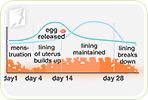Trying to stay sane when your body's hormones are fluctuating wildly can be tough, especially when you are experiencing irregular periods. Many women start to worry that they are pregnant or have an underlying condition if they don't get their period when they're expecting it. While these are still possibilities, for middle-aged women, menstrual irregularities are more likely a harmless sign of menopause. Follow these easy tips to help you take the changes that come during perimenopause in stride.
Always Be Prepared

The more prepared you are, the better you will be able to deal with irregular periods. Always travel with an extra pair of underwear, tampons, pads, and even an extra pair of pants or shorts in the trunk or your car. This will help keep any nagging concern about a period coming unexpectedly in check.
Talk to Your Partner about Menopause

Your partner may not understand what it is like for you to be going through such a drastic life change. However, if you explain it to them, they will likely be compassionate and help you overcome the challenges you are facing. Explain to them the emotional strain it may be putting on you and your life, and tell them explicitly what they can do to help. Make sure to be honest and forthcoming with them, and you two will be able to ride this time out together and end up stronger as a result.
Exercise

Regular exercise releases endorphin, a neurotransmitter that helps uplift mood. Exercise has been shown to reduce stress and promote relaxation. Try going for a 30-minute walk around your neighborhood, playing a sport, or taking a yoga or dance class. Exercising for 30 minutes a day, five times a week will help kick-start your energy levels and keep you going through your toughest days.
Eat Healthy

Adding more fruits and veggies into your diet seems like a small step, but it will yield big results. The nutrients found in healthier foods will help your body beat menopause symptoms and improve your overall well-being.
It is important to know how to deal with irregular periods, as they can last for up to 10 years over the course of the menopause transition. Click on the following link to learn about more specific ways to curb irregular periods.
Sources
- Harvard Health. (2011). Exercising to relax. Retrieved February 23, 2016, from http://www.health.harvard.edu/staying-healthy/exercising-to-relax
- Love, S. (2003). Menopause and Hormone Book. New York: Three Rivers Press.
- Office on Women's Health. (2014). Menstruation and the menstrual cycle fact sheet. Retrieved February 23, 2016, from http://www.womenshealth.gov/publications/our-publications/fact-sheet/menstruation.html



